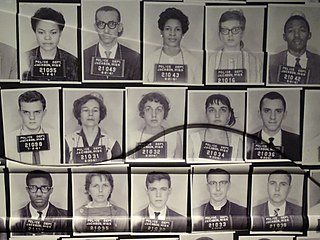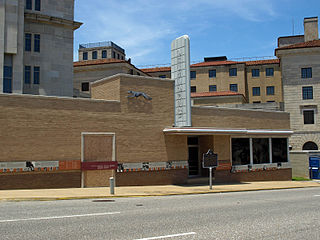
The civil rights movement was a nonviolent social movement and campaign from 1954 to 1968 in the United States to abolish legalized racial segregation, discrimination, and disenfranchisement throughout the United States. The movement had its origins in the Reconstruction era during the late 19th century, although it made its largest legislative gains in the 1960s after years of direct actions and grassroots protests. The social movement's major nonviolent resistance and civil disobedience campaigns eventually secured new protections in federal law for the civil rights of all Americans.

Medgar Wiley Evers was an American civil rights activist and the NAACP's first field secretary in Mississippi, who was murdered by Byron De La Beckwith. Evers, a decorated U.S. Army combat veteran who had served in World War II, was engaged in efforts to overturn segregation at the University of Mississippi, end the segregation of public facilities, and expand opportunities for African Americans including the enforcement of voting rights.

James Morris Lawson Jr. is an American activist and university professor. He was a leading theoretician and tactician of nonviolence within the Civil Rights Movement. During the 1960s, he served as a mentor to the Nashville Student Movement and the Student Nonviolent Coordinating Committee. He was expelled from Vanderbilt University for his civil rights activism in 1960, and later served as a pastor in Los Angeles for 25 years.

James Leonard Farmer Jr. was an American civil rights activist and leader in the Civil Rights Movement "who pushed for nonviolent protest to dismantle segregation, and served alongside Martin Luther King Jr." He was the initiator and organizer of the first Freedom Ride in 1961, which eventually led to the desegregation of interstate transportation in the United States.
Boynton v. Virginia, 364 U.S. 454 (1960), was a landmark decision of the US Supreme Court. The case overturned a judgment convicting an African American law student for trespassing by being in a restaurant in a bus terminal which was "whites only". It held that racial segregation in public transportation was illegal because such segregation violated the Interstate Commerce Act, which broadly forbade discrimination in interstate passenger transportation. It moreover held that bus transportation was sufficiently related to interstate commerce to allow the United States federal government to regulate it to forbid racial discrimination in the industry.

Freddie Lee Shuttlesworth was a U.S. civil rights activist who led the fight against segregation and other forms of racism as a minister in Birmingham, Alabama. He was a co-founder of the Southern Christian Leadership Conference, initiated and was instrumental in the 1963 Birmingham Campaign, and continued to work against racism and for alleviation of the problems of the homeless in Cincinnati, Ohio, where he took up a pastorate in 1961. He returned to Birmingham after his retirement in 2007. He worked with Martin Luther King Jr. during the civil rights movement, though the two men often disagreed on tactics and approaches.

Amzie Moore was an African-American civil rights leader and entrepreneur in the Mississippi Delta.
The Council of Federated Organizations (COFO) was a coalition of the major Civil Rights Movement organizations operating in Mississippi. COFO was formed in 1961 to coordinate and unite voter registration and other civil rights activities in the state and oversee the distribution of funds from the Voter Education Project. It was instrumental in forming the Mississippi Freedom Democratic Party. COFO member organizations included the National Association for the Advancement of Colored People.

The Journey of Reconciliation, also called "First Freedom Ride", was a form of nonviolent direct action to challenge state segregation laws on interstate buses in the Southern United States. Bayard Rustin and 18 other men and women were the early organizers of the two-week journey that began on April 9, 1947. The participants started their journey in Washington, D.C., traveled as far south as North Carolina, before returning to Washington, D.C.

Freedom Riders were civil rights activists who rode interstate buses into the segregated Southern United States in 1961 and subsequent years to challenge the non-enforcement of the United States Supreme Court decisions Morgan v. Virginia (1946) and Boynton v. Virginia (1960), which ruled that segregated public buses were unconstitutional. The Southern states had ignored the rulings and the federal government did nothing to enforce them. The first Freedom Ride left Washington, D.C. on May 4, 1961, and was scheduled to arrive in New Orleans on May 17.

The Freedom Rides Museum is located at 210 South Court Street in Montgomery, Alabama, in the building which was until 1995 the Montgomery Greyhound Bus Station. It was the site of a violent attack on participants in the 1961 Freedom Ride during the Civil Rights Movement. The May 1961 assaults, carried out by a mob of white protesters who confronted the civil rights activists, "shocked the nation and led the Kennedy Administration to side with civil rights protesters for the first time."

George Raymond Jr. was an African-American civil rights activist, a member of the Mississippi Freedom Democratic Party, a Freedom Rider, and head of the Congress of Racial Equality in Mississippi in the 1960s. Raymond influenced many of Mississippi's most known activists, such as Anne Moody, C. O. Chinn, and Annie Devine to join the movement and was influential in many of Mississippi's most notable Civil Rights activities such as a Woolworth's lunchcounter sit-in and protests in Jackson, Mississippi, Meredith Mississippi March, and Freedom Summer. Raymond fought for voting rights and equality for African Americans within society amongst other things.

Joan Trumpauer Mulholland is an American civil rights activist who was active in the 1960s. She was one of the Freedom Riders who was arrested in Jackson, Mississippi in 1961, and was confined for two months in the Maximum Security Unit of the Mississippi State Penitentiary. The following year she was the first white student to enroll at Tougaloo College in Jackson, Mississippi and served as the local secretary of the Student Nonviolent Coordinating Committee (SNCC).
Zev Aelony was an American activist involved in the Civil Rights Movement. He was an organizer of the civil rights student group Students for Integration, a CORE Soul Force Member, a Freedom Rider, and one of the Americus Four who faced a death penalty for helping citizens legally vote.
Henry "Hank" James Thomas is an African American civil rights activist and entrepreneur. Thomas was one of the original 13 Freedom Riders who traveled on Greyhound and Trailways buses through the South in 1961 to protest racial segregation, holding demonstrations at bus stops along the way.
Helen Singleton was an activist during the Civil Rights Movement, most notable for her participation as a Freedom Rider in Jackson, Mississippi.
This is a timeline of the civil rights movement in the United States, a nonviolent mid-20th century freedom movement to gain legal equality and the enforcement of constitutional rights for people of color. The goals of the movement included securing equal protection under the law, ending legally institutionalized racial discrimination, and gaining equal access to public facilities, education reform, fair housing, and the ability to vote.
David J. Dennis is a civil rights activist since the 1960s. He grew up in the segregated area of Omega, Louisiana. He worked as co-director of the Council of Federated Organizations (COFO), as director of Mississippi's Congress of Racial Equality (CORE), and as one of the organizers of the Mississippi Freedom Summer of 1964. He worked closely with both Bob Moses and Medgar Evers as well as members of SNCC, the Student Nonviolent Coordinating Committee. His first involvement in the Civil Rights Movement was at a Woolworth sit-in organized by CORE and he went on to become a Freedom Rider in 1961. More recently, Dennis has put his activism toward a new project; the Algebra Project, which is a nonprofit organization run by Bob Moses that aims to improve the mathematics education for minority children. Dennis also speaks about his experiences in the movement through an organization called Dave Dennis Connections.
Dion Tyrone Diamond is an American civil rights activist.

The Anniston and Birmingham bus attacks, which occurred on May 14, 1961, in Anniston and Birmingham, both Alabama, were acts of mob violence targeted against civil rights activists protesting against racial segregation in the Southern United States. They were carried out by members of the Ku Klux Klan and the National States' Rights Party in coordination with the Birmingham Police Department. The FBI did nothing to prevent the attacks despite having foreknowledge of the plans.











